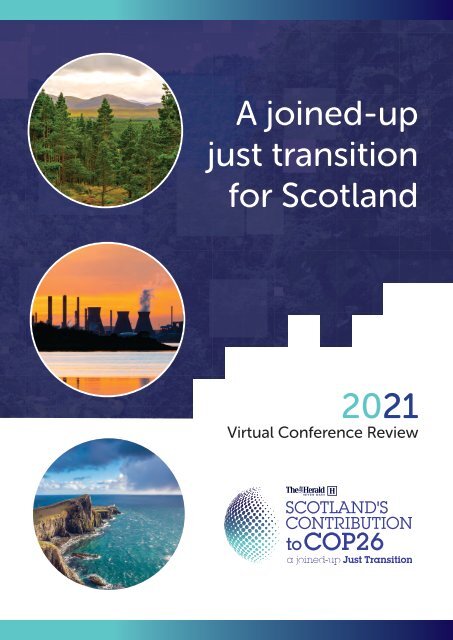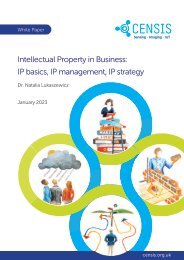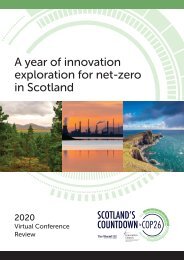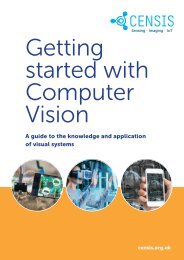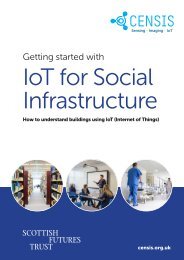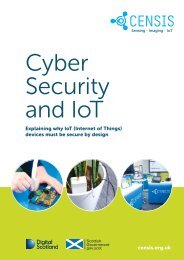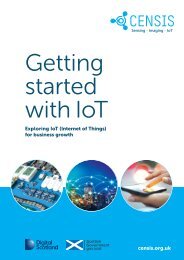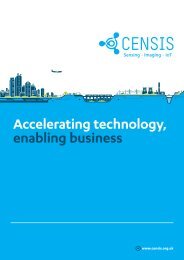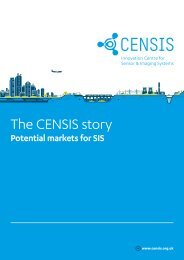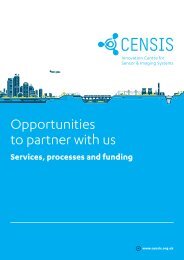A joined-up just transition for Scotland
In October 2021, just a few days before COP26 took place in Scotland, some of Scotland's leading innovators and changemakers came together to explore just transition to net zero, map the speed at which Scotland must tackle climate change and ensure no one is left behind.
In October 2021, just a few days before COP26 took place in Scotland, some of Scotland's leading innovators and changemakers came together to explore just transition to net zero, map the speed at which Scotland must tackle climate change and ensure no one is left behind.
Create successful ePaper yourself
Turn your PDF publications into a flip-book with our unique Google optimized e-Paper software.
A <strong>joined</strong>-<strong>up</strong><br />
<strong>just</strong> <strong>transition</strong><br />
<strong>for</strong> <strong>Scotland</strong><br />
2021<br />
Virtual Conference Review
Climate change is<br />
the greatest economic<br />
opportunity of<br />
our lifetime.<br />
Martin Valenti, Event Chair and Director <strong>for</strong> Net Zero,<br />
South of <strong>Scotland</strong> Enterprise<br />
27 partners across <strong>Scotland</strong>’s<br />
innovation, research and<br />
policy landscape<br />
489<br />
delegates<br />
27<br />
70<br />
489 6<br />
70 inspiring and<br />
in<strong>for</strong>med speakers<br />
6 themed stages<br />
and networking areas<br />
In brief: COP26<br />
COP26 – or the 26th UN Climate Change Conference of the Parties - took place in Glasgow in<br />
October-November 2021. It brought together thousands of heads of state, climate experts and<br />
campaigners to agree action to tackle climate change. It also allowed <strong>Scotland</strong> and Scottish businesses<br />
to showcase our climate action ambitions and achievements to a global audience.<br />
First Minister Nicola Sturgeon described it as “one of the most important events ever held in <strong>Scotland</strong>”.<br />
2<br />
Full agenda, speaker profiles and videos of all sessions at: https://newsquestscotlandevents.com/events/cop26-<strong>just</strong>-<strong>transition</strong>/
In October 2021, <strong>just</strong> a few days be<strong>for</strong>e COP26, some of <strong>Scotland</strong>’s leading<br />
innovators and changemakers came together to:<br />
• Explore the <strong>just</strong> <strong>transition</strong> to net zero<br />
• Map the speed and scale at which <strong>Scotland</strong> must tackle climate change<br />
• Ensure no one is left behind<br />
Delivered by CENSIS in partnership with 27 organisations across innovation, policy, research and industry,<br />
the event looked at priorities and opportunities in six specific themes:<br />
Skills Development<br />
Public Sector Services<br />
Built Environment<br />
Circularity<br />
Transport<br />
Future Work<strong>for</strong>ce<br />
This report summarises the ideas and calls to action from over 15 hours of discussion, giving essential insights<br />
to in<strong>for</strong>m your own contribution to a <strong>joined</strong>-<strong>up</strong> <strong>just</strong> <strong>transition</strong>.<br />
In brief: a <strong>just</strong> <strong>transition</strong><br />
The Scottish Government defines a <strong>just</strong> <strong>transition</strong> as both an ‘outcome’ and a ‘process’: “It s<strong>up</strong>ports a net<br />
zero and climate resilient economy in a way that delivers fairness and tackles inequality and in<strong>just</strong>ice.”<br />
Some people prefer to explain it in terms of what it is NOT. The usual example used is the intergenerational<br />
scarring and deprivation caused by the rapid <strong>transition</strong> away from mining coal in <strong>Scotland</strong>.<br />
Key messages from the day 2<br />
Plenary Session 4<br />
Skills Development 6<br />
Built Environment 8<br />
Transport 10<br />
Public Sector Services 12<br />
Circularity 14<br />
Future Work<strong>for</strong>ce 16<br />
Closing Sessions 18<br />
Partners 20<br />
See all partners here<br />
Full agenda, speaker profiles and videos of all sessions at: https://newsquestscotlandevents.com/events/cop26-<strong>just</strong>-<strong>transition</strong>/ 3
PLENARY SESSION<br />
You’ve got over 70 phenomenal<br />
speakers lined <strong>up</strong> – that’s like a<br />
Glastonbury of <strong>just</strong> <strong>transition</strong> experts.<br />
Dr Martin Valenti, South of <strong>Scotland</strong> Enterprise<br />
Opening the conference was Martin Valenti of South of <strong>Scotland</strong> Enterprise (SoSE), caffeinating the<br />
audience with a mix of optimism and exhortation. His focus was on “complete, collaborative, <strong>joined</strong>-<strong>up</strong><br />
working”, the importance of a <strong>just</strong> <strong>transition</strong>, and the opportunities <strong>for</strong> “new jobs, new lifestyles, new<br />
ways of living, and new exciting things that we can do.”<br />
THE HEADLINER<br />
First of the Glastonbury line-<strong>up</strong> was Richard Lochhead MSP, Minister <strong>for</strong> Just Transition,<br />
Employment and Fair Work.<br />
Outlining how far <strong>Scotland</strong> has come on its net zero <strong>transition</strong> and how far is still to go, he emphasised that<br />
the <strong>transition</strong> has to be fair to everyone: “<strong>Scotland</strong> does retain the scars of poorly managed economic and<br />
social change – not least in our coalmining communities.<br />
“That’s why our climate legislation … requires our journey to net zero to be aligned with the principles of <strong>just</strong><br />
<strong>transition</strong>. Delivery of this will ensure that the creation of socially sustainable jobs, low-carbon investment<br />
and engagement with communities is embedded in all aspects of our climate action.”<br />
THE SUPERGROUP<br />
Next <strong>up</strong> was a stellar panel of Professor James Curran, Professor Jim Skea, Lynne McEwan of<br />
Bruichladdich Distillery, Shaun Macleod of BSW Timber, Richard Hardy of Prospect Trade Union and<br />
Poonam Malik of University of Strathclyde.<br />
After each had given their personal perspective on <strong>just</strong> <strong>transition</strong>, the discussions centred on the four key<br />
messages of the Just Transition Commission Report (2021) and how to deliver them.<br />
1<br />
Pursue an orderly, managed <strong>transition</strong> to net zero that creates benefits and opportunities <strong>for</strong><br />
all. Panellists emphasised that the <strong>transition</strong> to net zero is not <strong>just</strong> about an outcome but a process.<br />
They mentioned the importance of roadmaps, of businesses investing in net zero knowledge, the<br />
role of government and enterprise and skills agencies, and the need to consider the international<br />
dimension to <strong>just</strong> <strong>transition</strong>.<br />
4 Full agenda, speaker profiles and videos of all sessions at: https://newsquestscotlandevents.com/events/cop26-<strong>just</strong>-<strong>transition</strong>/
2<br />
Equip<br />
3<br />
Empower<br />
people with the skills and education they need to benefit from the <strong>transition</strong>.<br />
Points mentioned included the importance of giving the current work<strong>for</strong>ce confidence to reskill,<br />
and the importance of creating a STEM pipeline in schools and tertiary education and then avoiding<br />
skills ‘leakage’.<br />
and invigorate our communities and strengthen local economies. Highlighted here were<br />
the potential of the circular economy to create a more resilient economy, and fostering social<br />
partnerships and local action – from regional land use partnerships to community-generated<br />
electricity – to deliver inclusive green recovery.<br />
4<br />
Share<br />
benefits widely and ensure burdens are distributed on the basis of ability to pay. Discussion<br />
ranged from the conceptual (e.g., is GDP the right metric <strong>for</strong> economies) to the specific (who<br />
should pay <strong>for</strong> the rollout of EV charge points and the decarbonisation of heat).<br />
I encourage you all to work with us in using (COP26) as a<br />
pivotal moment in <strong>Scotland</strong>’s history, to help plan how we<br />
<strong>transition</strong> to net zero across all sectors of our society and in<br />
the process create a fairer greener <strong>Scotland</strong> that we are all proud to call home.<br />
Richard Lochhead MSP, Minister <strong>for</strong> Just Transition, Employment and Fair Work, Scottish Government<br />
THE CLOSING ACT<br />
Last on the bill was Mike Cantlay, Chair of the Scottish Funding Council (SFC), in conversation with<br />
Martin Valenti about one of <strong>Scotland</strong>’s greatest assets in a <strong>just</strong> <strong>transition</strong>: the education sector.<br />
Their conversation highlighted the sector’s dual role in that <strong>transition</strong>: as well as providing education and<br />
skills to the next generation, it leads on research and innovation in the green economy, collaborating with<br />
industry to deliver a green recovery. Asked which elements of the sector he was<br />
proudest of, he pointed to <strong>Scotland</strong>’s seven Innovation Centres and SFC’s idea<br />
to create them: “You wouldn’t imagine <strong>Scotland</strong> today without the<br />
Further<br />
Innovation Centre programme.”<br />
reading<br />
We have to address challenges<br />
rather than assume that someone<br />
else younger or smarter than us will<br />
do something at some point in the future.<br />
Dr Martin Valenti, South of <strong>Scotland</strong> Enterprise<br />
Just Transition<br />
Commission 2022<br />
Just Transition<br />
Commission 2019-2021<br />
You can watch the full<br />
morning plenary<br />
session here<br />
Full agenda, speaker profiles and videos of all sessions at: https://newsquestscotlandevents.com/events/cop26-<strong>just</strong>-<strong>transition</strong>/<br />
5
THEME 1: SKILLS DEVELOPMENT<br />
Hosted by ESP<br />
ESP is a collaboration of <strong>Scotland</strong>’s colleges and industry partners established to increase <strong>Scotland</strong>’s<br />
capability and capacity to delivery the right skills <strong>for</strong> the energy, engineering and construction sectors to<br />
meet industry demand.<br />
Esp-scotland.ac.uk<br />
Opening the Skills Development session was Jim Brown of ESP, introducing a packed agenda covering policy<br />
drivers, industry leadership, cross-sector collaboration and college activity across key sectors.<br />
A key document <strong>for</strong> anyone in this sphere is the Climate Emergency Skills Action Plan (CESAP), so Elaine Ellis<br />
of Skills Development <strong>Scotland</strong> (SDS) gave a useful overview. One key message rang out: delivering it has to<br />
be a huge, collective ef<strong>for</strong>t – involving not <strong>just</strong> skills agencies, employers and educators, but procurement,<br />
‘changemakers across society’, and influencers such as careers advisers and parents.<br />
The following sessions showed some of the work being done in different sectors to deliver this<br />
collective ef<strong>for</strong>t.<br />
OIL AND GAS TRANSITION<br />
Speakers from ESP, the Scottish Offshore Energy Council (SOEC) and OPITO outlined the skills activity<br />
underway in the offshore sector to s<strong>up</strong>port a <strong>just</strong> <strong>transition</strong> to net zero. The landscape is complex, with<br />
multiple players involved and activity continually being added. But running across their presentations were<br />
themes that would also recur in the following three sessions:<br />
• the importance of maximising the value of the <strong>transition</strong> <strong>for</strong> <strong>Scotland</strong> – including increasing Scottish<br />
content and building domestic s<strong>up</strong>ply chains<br />
• the need <strong>for</strong> a pipeline of STEM skills and <strong>for</strong> a more diverse work<strong>for</strong>ce<br />
• the benefits of developing transferable skills and flexible pathways, to create confidence and agility<br />
in the work<strong>for</strong>ce.<br />
ADVANCED MANUFACTURE<br />
Several of those themes were restated during the Advanced Manufacturing session, as was another common<br />
message: “when public and private are aligned, what we can do is incredible”. Other take-outs from this session,<br />
featuring speakers from the Scottish Manufacturing Advisory Service (SMAS), Scottish Engineering and EPS, included:<br />
• the need <strong>for</strong> develop core manufacturing skills at volume since these are a critical stepping-stone to<br />
advanced manufacturing skills<br />
• the importance of s<strong>up</strong>porting colleges and college staff on emerging technologies.<br />
There was some recommended homework too: Kotter’s Change Model and the Scottish Government’s<br />
manufacturing recovery plan.<br />
6 Full agenda, speaker profiles and videos of all sessions at: https://newsquestscotlandevents.com/events/cop26-<strong>just</strong>-<strong>transition</strong>/
LOW-CARBON TRANSPORT<br />
Speakers introduced the activity being done to address skills gaps and opportunities in low-carbon transport.<br />
The first example was electric vehicle (EV) skills such as maintenance, repair and charge point maintenance.<br />
This work illustrates the breadth of tasks and players involved in skills development: right through from<br />
understanding requirements to identifying gaps to working with accreditation bodies and assessors.<br />
A second example was the work planned at the Michelin <strong>Scotland</strong> Innovation Parc (MSIP) Skills Academy. This is<br />
bringing together education, employers and the wider community to create a skills pipeline from “pre-entry to<br />
apprenticeships to PhDs to graduate placements s<strong>up</strong>porting knowledge exchange” on opportunities like hydrogen.<br />
CONSTRUCTION, ENERGY EFFICIENCY AND MICROGENERATION<br />
In the final section, the value of collaboration was again to the <strong>for</strong>e, along with the need to “join <strong>up</strong> training and<br />
funding and s<strong>up</strong>port to make a strong s<strong>up</strong>ply chain”. Examples included grants and practical resources <strong>for</strong> small<br />
businesses, enabling them to target the opportunities in, say, low-carbon heating installation.<br />
There were also useful reminders about regional inclusivity – with colleges across <strong>Scotland</strong>, including in rural<br />
areas, needing s<strong>up</strong>port with funding, facilities and training to teach low-carbon skills.<br />
WRAPPING UP<br />
Finally, Jim Brown summed <strong>up</strong> with some takeaway<br />
messages:<br />
• there’s a need to pull together on the CESAP and<br />
inspire the future and existing work<strong>for</strong>ce, but “we<br />
shouldn’t be too negative”: there’s really good work<br />
going on<br />
• government and agencies should consider skills<br />
from the outset of any policy that’s coming through<br />
• on the delivery side, <strong>Scotland</strong> needs to develop<br />
capacity and capabilities in advance of demand. But<br />
skills providers can’t do that in isolation – they need<br />
to be incentivised and s<strong>up</strong>ported.<br />
Ultimately this is about<br />
people and we need<br />
the work<strong>for</strong>ce to be<br />
com<strong>for</strong>table and feed into this journey<br />
that we are about to embark on.<br />
John McDonald, OPITO<br />
One of the biggest challenges is<br />
to understand what we mean<br />
by green jobs and skills – we are<br />
talking about trans<strong>for</strong>mational change and as<br />
of yet there is not necessarily the understanding<br />
of that level of change across society.<br />
Elaine Ellis, SDS<br />
WANT TO<br />
KNOW MORE?<br />
Resources mentioned in this<br />
session include:<br />
Climate Emergency Skills Action Plan<br />
Kotter’s Change Model<br />
Making <strong>Scotland</strong>’s Future – a<br />
recovery plan <strong>for</strong> manufacturing<br />
You can watch the full<br />
Skills Development<br />
session here.<br />
Full agenda, speaker profiles and videos of all sessions at: https://newsquestscotlandevents.com/events/cop26-<strong>just</strong>-<strong>transition</strong>/<br />
7
THEME 2: BUILT ENVIRONMENT<br />
Delivered by Construction <strong>Scotland</strong> Innovation Centre (CSIC)<br />
Update May 2022: CSIC is now known as Built Environment-Smarter Trans<strong>for</strong>mation (BE-ST).<br />
CSIC is an Innovation Centre that defines innovation as ‘change that unlocks new values’. By linking<br />
together businesses, university experts, the public sector and the economic development networks,<br />
their industry-led team s<strong>up</strong>ports a culture of innovation that drives trans<strong>for</strong>mational change across the<br />
construction industry.<br />
be-st.build<br />
innovationcentres.scot<br />
The built environment is a key component of the Scottish economy, creating around £8bn of GVA directly and<br />
linking to every other sector. It there<strong>for</strong>e has a “critical role to play in creating a fair, strong, resilient future”.<br />
That was the scene-setter from Stephen Good of CSIC, opening the session on the built environment.<br />
Humanity is the main<br />
driver of the climate<br />
change we’re seeing<br />
at the moment, but we are also<br />
the solution.<br />
David Raey, University of Edinburgh<br />
Creating new spaces,<br />
places, homes and<br />
communities requires<br />
new approaches and business<br />
models to ensure a fair zero-carbon<br />
built world <strong>for</strong> all.<br />
Lucy Black, CSIC<br />
BUILDING A JUST SCOTLAND<br />
Laying the foundations <strong>for</strong> the session was a panel discussion of the priorities, opportunities and tensions <strong>for</strong><br />
<strong>Scotland</strong> as it engineers a <strong>just</strong> <strong>transition</strong>. Panellists from the Scottish Government, SEPA, SELECT and the Fair<br />
Futures Partnership set out the essentials:<br />
• avoiding the mistakes of <strong>Scotland</strong>’s past, specifically the <strong>transition</strong> from coal, and “bringing all citizens along<br />
with us”<br />
• ensuring a <strong>just</strong> skills <strong>transition</strong><br />
• s<strong>up</strong>porting SMEs to participate in new s<strong>up</strong>ply chains<br />
• developing and incentivising net zero solutions <strong>for</strong> existing building stock, as well as new-build<br />
• futureproofing <strong>Scotland</strong>’s built environment.<br />
Asked if there are <strong>just</strong> <strong>transition</strong> pioneers <strong>Scotland</strong> could learn from, panellists mentioned the Nordic countries,<br />
the C40 Cities Climate Leadership Gro<strong>up</strong> and local initiatives such as the Queens Quay regeneration project in<br />
Clydebank and the Glasgow Community Energy coop.<br />
8 Full agenda, speaker profiles and videos of all sessions at: https://newsquestscotlandevents.com/events/cop26-<strong>just</strong>-<strong>transition</strong>/
FOR OUR PEOPLE, BY OUR PEOPLE<br />
Building on that discussion was a session looking at how we develop the built environment work<strong>for</strong>ce and<br />
ensure it is equitable and representative of our society.<br />
Opening was Professor David Raey of the University of Edinburgh, summarising current challenges, especially<br />
in skills, and giving a rallying call to use climate action to address inequalities and create opportunities.<br />
Nicola Jackson of Robertson Timber Engineering showed how this can be done in practice, introducing the My<br />
Climate Path COP26 education legacy initiative. Created by Developing the Young Work<strong>for</strong>ce (DYW), it’s helping<br />
to bring 16-24 year-olds into green jobs. Businesses can s<strong>up</strong>port it by becoming one of its Climate Heroes.<br />
Her call <strong>for</strong> inclusivity in the skills system – and also in decision-making on energy <strong>transition</strong> – was echoed by<br />
Aisling O’Reilly of the University of Edinburgh, one of CSIC’s BE Changemakers.<br />
RETROFIT: THE ART OF THE POSSIBLE<br />
The retrofit challenge is a critical focus at both national and regional level, with 430,000 homes in the Glasgow<br />
area alone needing some level of retrofit to meet net zero targets.<br />
According to Susan Aitken of Glasgow City Council, a recent cost benefit analysis conducted <strong>for</strong> the Council<br />
showed that each £1m spent on retrofit could deliver between £2m and £6m in benefits, including cost savings,<br />
carbon savings, health benefits and job creation. Retrofit is at the heart of Glasgow’s ‘Greenprint <strong>for</strong> Investment’.<br />
Building per<strong>for</strong>mance specialist Barbara Lantschner and architect Ann-Marie Fallon then added their on-theground<br />
insights, talking about the Niddrie Road tenement retrofit project and the critical importance of cyclical<br />
learning and “true, meaningful collaboration” in retrofit projects.<br />
BUILDING BETTER: A FAIRER BUILT ENVIRONMENT FOR ALL<br />
Topping out the session were Lucy Black of CSIC and Nick Bolton and Richard Scott of SNRG, discussing new<br />
business models and approaches to creating homes and places. Points to note were:<br />
• the housing sector has developed slowly in terms of per<strong>for</strong>mance – the cars of the 1970s and 2020s are<br />
completely different; the housing of the 1970s and 2020s less so<br />
• modern building approaches can address not only climate change but societal issues such as social<br />
isolation and housing af<strong>for</strong>dability. They also provide opportunities to build local s<strong>up</strong>ply chains – e.g., <strong>for</strong><br />
indigenous mass timber<br />
• cost comparisons between construction methods must consider opex as well as capex.<br />
My advice [to builders, social<br />
landlords and others] to adapt<br />
to zero carbon would be to<br />
embrace the opportunity. Engage with it.<br />
Nick Bolton, SNRG<br />
WANT TO<br />
KNOW MORE?<br />
Initiatives mentioned in this session:<br />
C40 Cities<br />
Queens Quay in Clydebank<br />
Glasgow Community Energy coop<br />
My Climate Path<br />
Niddrie Road project in Glasgow<br />
Glasgow‘s Greenprint <strong>for</strong> Investment<br />
SNRG’s timber house at the<br />
BE@COP26 showcase<br />
You can watch the full<br />
Built Environment<br />
session here<br />
Full agenda, speaker profiles and videos of all sessions at: https://newsquestscotlandevents.com/events/cop26-<strong>just</strong>-<strong>transition</strong>/<br />
9
Theme 3: Transport<br />
Delivered by PNDC<br />
PNDC is a research and testing hub founded by government, industry and academia which advances<br />
innovative ideas into business as usual <strong>for</strong> their members. They provide this through a rich research<br />
programme with a highly skilled post-doctorate team, alongshide one of the world’s most unique and<br />
comprehensive testing sites, with state-of-the-art assets in a real-world environment.<br />
pndc.co.uk<br />
Opening the session, Jacqueline Redmond of PNDC emphasised the need <strong>for</strong> a whole-systems approach to<br />
transport decarbonisation and <strong>just</strong> <strong>transition</strong>.<br />
Illustrating the breadth of stakeholders involved in such an approach, PNDC had invited a range of “people<br />
we think are making a real difference” to discuss <strong>Scotland</strong>’s challenges, opportunities and strengths in<br />
decarbonising transport.<br />
SETTING THE FRAMEWORK<br />
First of the organisations and individuals “making a<br />
real difference” was Matthew Eastwood of Transport<br />
<strong>Scotland</strong>, with a whistle-stop tour of Scottish<br />
Government policy and targets <strong>for</strong> the future of<br />
transport. Points to note were:<br />
• the significant opportunities <strong>for</strong> domestic<br />
businesses and international partners in batteries<br />
and energy storage, hydrogen, and heavy-duty<br />
vehicles<br />
• the ambition to develop Scottish s<strong>up</strong>ply chains<br />
and create “good, green jobs”.<br />
EFFECTIVE PLANNING AND SYSTEMS<br />
It’s coming through<br />
that there’s no single<br />
solution to (decarbonising<br />
transport) – EVs alone won’t do it,<br />
and there’s a toolkit of responses<br />
that is going to <strong>for</strong>m part of our<br />
future delivery.<br />
Ally McInroy, Technology <strong>Scotland</strong><br />
Planning <strong>for</strong> a <strong>just</strong> <strong>transition</strong> on transport necessarily involves players from different parts of the landscape,<br />
including industry and local government. Jim McOmish of SP Energy Networks and Deborah Paton of Glasgow<br />
City Council delivered their own insights.<br />
Jim McOmish described a range of SP Energy Networks projects helping to in<strong>for</strong>m future network investment<br />
and to show how DNOs (distribution network operators) can work with local government to facilitate universal<br />
access to a public EV infrastructure.<br />
Deborah Paton then described how Glasgow City Council is using policy development, technology and –<br />
crucially – engagement with citizens and communities in its own whole-systems approach to decarbonising<br />
transport. Managing challenges such as equality, fairness and the digital divide is essential to ensure that all<br />
communities are included in, and benefit from, decarbonisation.<br />
10 Full agenda, speaker profiles and videos of all sessions at: https://newsquestscotlandevents.com/events/cop26-<strong>just</strong>-<strong>transition</strong>/
INNOVATION IN MOTION<br />
Also emphasising the whole-systems approach were First Bus and the Michelin <strong>Scotland</strong> Innovation Parc (MSIP)<br />
in Dundee.<br />
First Bus has committed to a fully decarbonised bus fleet by 2035, and already operates 24 electric buses in<br />
Glasgow and 15 hydrogen buses in Aberdeen. So, what does it need in place to deliver its commitments? John<br />
Birtwistle’s summary included: more efficient use of road space; investment in infrastructure right through from<br />
strategic grid capacity to depot connections; and a skills base of people able to drive and maintain electric and<br />
hydrogen buses.<br />
In other words, it will require partnerships between industry, investors, policymakers and the education /<br />
training system – to name a few.<br />
Private-public partnerships were also a focus <strong>for</strong> Sarah Petrie in her description of MSIP’s planned activity on<br />
manufacturing, innovation and skills development. Among the multi-partner facilities highlighted were:<br />
• MSIP Skills Activity, covering a broad curriculum from entry level to HNDs to research to reskilling<br />
• Low Carbon Transport Applications Test Centre (LOCATE), s<strong>up</strong>porting heavy duty vehicle plat<strong>for</strong>m testing<br />
and innovation, with the aim to deliver jobs, skills and s<strong>up</strong>ply chain development.<br />
WRAPPING UP<br />
The session ended with Ally McInroy of Technology <strong>Scotland</strong> chairing a panel discussion to explore key issues<br />
and perspectives. Among the points made were:<br />
• <strong>Scotland</strong> is open to ideas, opportunities, new business models, and partnerships with industry and investors<br />
• electrification must be accompanied by a modal shift in transport<br />
• skills development is critical<br />
• green <strong>transition</strong> must be inclusive, with benefits spread across regions, cities, society, communities and<br />
sectors, and the costs not “landing on those least able to pay”<br />
• one of the toughest challenges ahead will be behavioural change. Educating, in<strong>for</strong>ming and influencing<br />
will be crucial.<br />
We’re on the right track but we can’t<br />
let <strong>up</strong> on the innovation … to make<br />
it the fair and <strong>just</strong> <strong>transition</strong> you’ve<br />
heard about today.<br />
Jacqueline Redmond, PNDC<br />
Deborah Paton, Glasgow City Council<br />
Transport has a positive role in<br />
tackling poverty, improving health<br />
and reducing inequalities.<br />
WANT TO<br />
KNOW MORE?<br />
Activity mentioned in this session:<br />
SP Energy Networks’ EV-UP project,<br />
Project PACE and Green Economy Fund<br />
First Bus electrification activity at its<br />
Caledonia depot in Glasgow<br />
PNDC work on the Driving the Electric<br />
Revolution programme<br />
MSIP Skills Academy and LOCATE facility<br />
Glasgow City Council development<br />
planning<br />
You can watch the full<br />
Transport session here<br />
Full agenda, speaker profiles and videos of all sessions at: https://newsquestscotlandevents.com/events/cop26-<strong>just</strong>-<strong>transition</strong>/<br />
11
THEME 4:<br />
PUBLIC SECTOR SERVICES<br />
Delivered by Digital Health & Care Innovation Centre (DHI)<br />
and Precision Medicine <strong>Scotland</strong><br />
DHI and PMS are Innovation Centres in <strong>Scotland</strong>. By combining insights from the digital and genomic<br />
revolutions, DHI can reduce inefficiencies in health and care delivery, improve access, minimise costs,<br />
increase quality and make health and care truly person-centres. PMS-IC’s focus is on linking <strong>Scotland</strong>’s<br />
domain expertise, data assets and delivery capability to accelerate the adoption of Precision Medicine: new<br />
products and services <strong>for</strong> a global market.<br />
dhi-scotland.com<br />
precisionmedicinescotland.com<br />
innovationcentres.scot<br />
“Everyone thinks that health and care services have a small, if any, part to play in this global movement (towards<br />
a <strong>just</strong> <strong>transition</strong> to net zero) but with about 6-7% of emissions coming from health and social care provision, we<br />
can and need to play our part.”<br />
That was Professor George Crooks of DHI, opening the session on public sector services.<br />
It was never easy to start with to build a hospital.<br />
To add further priorities and outcomes on each of<br />
those is a challenge… However, healthcare has<br />
never stayed the same, it is always driving to improve.<br />
Susan Grant, NHS <strong>Scotland</strong><br />
BUILDING TO ZERO CARBON EMISSIONS<br />
George <strong>joined</strong> <strong>for</strong>ces with Darren Kilburn of FarrPoint and Susan Grant of NHS <strong>Scotland</strong> to signpost key<br />
opportunities and challenges in terms of using digital technology to s<strong>up</strong>port <strong>Scotland</strong>’s net zero ambitions.<br />
Notable points included:<br />
• with an ageing population and long-term multiple conditions on the rise, e-health and digital will be key to<br />
delivering smarter healthcare<br />
• future digital tools and services will shift the balance of care away from treatment and post-event care,<br />
towards prevention and anticipation of illness, and independent living<br />
• hospitals can act as a ‘Formula 1’ environment, offering options to develop and test solutions which can<br />
trickle down to other settings<br />
• the journey towards net-zero health and care must be co-designed with all stakeholders – from clinicians<br />
to hospital porters to patients and their families.<br />
12 Full agenda, speaker profiles and videos of all sessions at: https://newsquestscotlandevents.com/events/cop26-<strong>just</strong>-<strong>transition</strong>/
Act<br />
STREAMLINING PUBLIC SERVICE DELIVERY<br />
Next <strong>up</strong> came Chaloner Chute of DHI, Paul McGinness of Storm ID and David Lowe of Queen Elizabeth<br />
University Hospital. Their task: to show how low-carbon virtual models can contribute to health and care<br />
delivery.<br />
They started with the context: 3.5% of all road travel in the UK relates to NHS activity, equating to 10 billion<br />
miles a year. DHI project activity is showing how digital solutions could deliver benefits from cutting travel to<br />
saving clinician time to reduced hospital admissions.<br />
Chaloner Chute then took these points further – looking at how person-centred data sharing could be a<br />
catalyst <strong>for</strong> trans<strong>for</strong>mation of public service delivery, including in areas beyond health and care.<br />
His foundation <strong>for</strong> this was the DHI Exchange’s experience of working on over 50 co-design projects and<br />
evidence of citizens’ desire to “tell their story once” and to access and understand their own data and guidance.<br />
This in turn points to the need and opportunity <strong>for</strong> an architecture allowing data to be stored, moved between<br />
different health and care services and verified.<br />
HOW CAN PRECISION MEDICINE HELP?<br />
With medicines contributing around 25% of emissions in the NHS, David Bunton of Reprocell Europe and Claire<br />
Wallace of Thermofisher explained the role of precision medicine in reducing this. The Precision Medicine<br />
<strong>Scotland</strong> Innovation Centre (PMS-IC) estimates that implementing precision medicine technologies into the<br />
NHS could achieve potential savings of £85m over 3-5 years, as well as improving patient outcomes.<br />
For example, a pharmacogenics (PGx) approach to healthcare can help to identify responders and nonresponders<br />
to medicines, avoid adverse drug reactions, and optimise drug dosages.<br />
THE FUTURE OF PUBLIC SECTOR WORK<br />
The last session gave a glimpse of the future of public sector service delivery.<br />
Sanna Rimpiläinen of DHI looked at the new digital skills needed <strong>for</strong> sustainable public sector work – not <strong>just</strong> in<br />
the work<strong>for</strong>ce but among citizens self-managing their conditions.<br />
And finally we were introduced to the future of care at home, in care homes and social housing, with<br />
Colin Foskett of Blackwood Homes describing how its CleverCogs digital system and Innovate UK-funded<br />
Peoplehood project are helping to s<strong>up</strong>port independent living and healthy ageing.<br />
It is not possible to grow an<br />
economy in a developed nation,<br />
meet net zero targets, and care<br />
<strong>for</strong> the social wellbeing of the nation without<br />
digital solutions.<br />
Darren Kilburn, FarrPoint<br />
WANT TO<br />
KNOW MORE?<br />
Activity and initiatives mentioned<br />
in this session include:<br />
DHI Exchange<br />
DHI projects<br />
Blackwood Gro<strong>up</strong>’s CleverCogs system<br />
and Peoplehood project<br />
You can watch the whole<br />
Public Sector Services<br />
session here.<br />
Bla<br />
Yo<br />
Full agenda, speaker profiles and videos of all sessions at: https://newsquestscotlandevents.com/events/cop26-<strong>just</strong>-<strong>transition</strong>/<br />
13
THEME 5: CIRCULARITY<br />
Delivered by Zero Waste <strong>Scotland</strong><br />
Zero Waste <strong>Scotland</strong> exists to lead <strong>Scotland</strong> to use products and resources responsibly, focusing on where<br />
we can have the greatest impact on climate change. Using evidence and insight, their goal is to in<strong>for</strong>m<br />
policy, and motivate individuals and businesses to embrace the environmental, economic, and social<br />
benefits of a circular economy.<br />
zerowastescotland.org.uk<br />
The average Scot consumes over 18 tonnes of materials each year. To address the climate crisis, we need to<br />
rethink how we consume resources – in <strong>Scotland</strong> and the rest of the world. Change is needed system-wide.<br />
This was the focus of the Zero Waste <strong>Scotland</strong> session on circularity, looking at how to implement change at<br />
the scale and pace needed and in a way that generates new and inclusive opportunities <strong>for</strong> <strong>Scotland</strong>.<br />
REIMAGINE<br />
First <strong>up</strong>, Jill Farrell of Zero Waste <strong>Scotland</strong> discussed how to reimagine our traditional linear approach with<br />
three experts on the front line of circularity: Ilektra Kouloumpi of Circle Economy, Wayne Hubbard of ReLondon<br />
and Donald McCalman of Circularity <strong>Scotland</strong>.<br />
Key points from the ideas-rich discussion included:<br />
• cities and regions are key players in the <strong>just</strong> <strong>transition</strong> to a circular economy and will each need their own<br />
tailored approaches<br />
• circularity can bring significant social benefits as well as environmental and economic benefits. Wayne<br />
Hubbard talked about using circularity to create more resilient and more <strong>just</strong> local economies, while Ilektra<br />
Kouloumpi related circularity to inclusivity and ‘doughnut economics’<br />
• there are difficult decisions to be made - from how we consume ‘stuff’ to how policymakers avoid<br />
offshoring their challenges or creating unintended consequences globally<br />
• <strong>Scotland</strong>’s proposed Deposit Return Scheme could promote wider consumer behaviour change.<br />
REINVENT<br />
The shift to a circular economy must involve businesses of all sizes. In this next session, three very different<br />
businesses discussed their own contribution.<br />
Maclean’s Highland Bakery and Windswept Brewing Company are using spent grain (draff) from brewing to<br />
make crackers, having been connected by Zero Waste <strong>Scotland</strong>. As a result, both companies intend to seek<br />
further opportunities to become more circular.<br />
Meanwhile, Renewable Parts is inventing a new opportunity: building a s<strong>up</strong>ply chain <strong>for</strong> reused or remodelled<br />
parts in the wind industry. In the fast-growing wind industry, it’s a significant systemic change to get people<br />
designing <strong>for</strong> reuse as well as per<strong>for</strong>mance and manufacture.<br />
All three businesses agreed on the need <strong>for</strong> mindset change, willingness to collaborate, and external s<strong>up</strong>port –<br />
whether that’s grants, skills, advice or connections.<br />
14 Full agenda, speaker profiles and videos of all sessions at: https://newsquestscotlandevents.com/events/cop26-<strong>just</strong>-<strong>transition</strong>/
RETHINK<br />
The final two sessions considered two specific sectors where new circular models are needed: food and<br />
fashion.<br />
Iain Gulland of Zero Waste <strong>Scotland</strong>, Pete Ritchie of Nourish <strong>Scotland</strong> and Professor Ian Black of Stirling<br />
University gave interesting food <strong>for</strong> thought:<br />
• globally, over a third of food produced is wasted, and a quarter of all water involved in agriculture is wasted<br />
through food waste<br />
• although 60% of food waste in <strong>Scotland</strong> occurs at household level, both panellists warned against blaming<br />
or preaching to consumers<br />
• household food waste is linked to wider issues around food marketing and how we shop, work<br />
and commute<br />
• large retailers have been highly effective at reducing food waste, but waste is being pushed downstream<br />
and <strong>up</strong>stream to households and s<strong>up</strong>pliers. Pete Ritchie suggested solutions such as whole-field contracts<br />
and intervention on unit pricing.<br />
And, finally, fast fashion came under the spotlight. Here too, panellists from Zero Waste <strong>Scotland</strong>, Glasgow<br />
University, AWS and Sustainable Fashion <strong>Scotland</strong> advocated whole-system change rather than loading<br />
responsibility <strong>for</strong> change solely on consumers. Ideas and recommendations included:<br />
• further research into consumer and brand attitudes to boost understanding of how to change behaviour<br />
• brands should view alternative business models – such as rental and remodelling – as opportunities to build<br />
customer relationships<br />
• given the importance of language in behaviour change, ‘fashion users’ or ‘citizens’ may be better terms than<br />
‘consumers’<br />
• overproduction in the fashion industry also needs to be addressed systemically.<br />
It’s absolutely essential that governments,<br />
universities, citizens and businesses<br />
have a role if we’re going to be successful<br />
(on a <strong>just</strong> <strong>transition</strong>).<br />
Jill Farrell, Zero Waste <strong>Scotland</strong><br />
It’s about getting the conversations<br />
going – we don’t know where<br />
our waste could be used, or how<br />
we can use someone else’s waste, until we’ve had<br />
that conversation.<br />
WANT TO<br />
KNOW MORE?<br />
Activity and initiatives mentioned<br />
in this session include:<br />
Doughnut economics<br />
Deposit Return Scheme<br />
Maclean’s Highland Bakery and<br />
Windswept Brewing project<br />
You can watch the full<br />
Circularity session here.<br />
Nigel Tiddy, Windswept Brewing<br />
Full agenda, speaker profiles and videos of all sessions at: https://newsquestscotlandevents.com/events/cop26-<strong>just</strong>-<strong>transition</strong>/<br />
15
THEME 6: FUTURE WORKFORCE<br />
Delivered by Fuel Change<br />
Fuel Change is a social enterprise movement, which taps into the potential of youth to help fight the<br />
climate crisis. They unleash the underestimated skills and energy of <strong>Scotland</strong>’s youth by partnering with<br />
educators and businesses to help solve their carbon challenges.<br />
Fuelchange.co.uk<br />
Introducing the session was TV presenter Amy Irons, explaining Fuel Change’s objective to “ensure employers<br />
out there have the opportunity to listen to what our young people have to say about climate action – not <strong>just</strong><br />
those who are already climate activists but those who currently feel they can’t make a difference.”<br />
With that in mind, Fuel Change brought together apprentices, high school p<strong>up</strong>ils, employers and teachers<br />
in October to imagine what the work<strong>for</strong>ce will look like by 2045 and 2030 if we take – or don’t take –<br />
climate action.<br />
BY THE YEAR 2045<br />
Opening the discussions was a presentation by Iain Findlay of Aurora Sustainability, painting a picture of what<br />
2045 could look like if the world comes together on climate action.<br />
After describing the difference between 2C and 1.5C of global warning as an additional 400 million people<br />
having to deal with extreme heat waves, he moved to a more positive scenario: a 2045 where the linear economy<br />
has trans<strong>for</strong>med into a circular, regenerative one and where cities are trans<strong>for</strong>med into ‘green oases’ in which<br />
windows are solar panels, living walls s<strong>up</strong>port wildlife and building materials like hemp are carbon-negative.<br />
The task <strong>for</strong> people of all ages, he said, was to figure out what we need to do to get there.<br />
THE GEN Z PERSPECTIVE ON 2045<br />
A panel of apprentices, along with audience members, responded to Iain’s picture of the future.<br />
Some described the steps they’re taking in their own lives, such as cutting down on meat, but also the<br />
barriers to change, such as the fact that taking public transport to work instead of driving would increase one<br />
apprentice’s journey from 40 minutes to two and a half hours.<br />
They also suggested what employers could do to deliver climate action:<br />
• s<strong>up</strong>port employees’ behaviour change with EV charging points, bike parks or workplace buses<br />
• incentivise change through job conditions and benefits, e.g., offering a four-day week conditional on<br />
employees using green transport options<br />
The other major point emerging from both panel and audience members was a plea <strong>for</strong> more and better<br />
in<strong>for</strong>mation:<br />
• climate education throughout the school curriculum<br />
• better career in<strong>for</strong>mation about green job pathways<br />
• telling young people about the opportunities in climate <strong>transition</strong> and their ability to make a difference,<br />
rather than <strong>just</strong> talking about “ice caps melting and everything [being] terrible”.<br />
16 Full agenda, speaker profiles and videos of all sessions at: https://newsquestscotlandevents.com/events/cop26-<strong>just</strong>-<strong>transition</strong>/
BY THE YEAR 2030<br />
The second session took a similar approach, with Iain Findlay presenting a scenario of what 2030 could look<br />
like: this included eating less meat, using localised production and shopping to take waste out of the system,<br />
and replacing “buying products with consuming utility” (e.g., paying <strong>for</strong> mobility rather than owning cars).<br />
THE GEN Z PERSPECTIVE ON 2030<br />
In this 2030 session too, both audience and apprenticeships responded strongly to Iain’s presentation. Several<br />
people described how they were s<strong>up</strong>porting change through, <strong>for</strong> example:<br />
• buying more local meat and seasonal fruit and vegetables<br />
• doing their own Fuel Change projects, <strong>for</strong> example a project to reuse materials from decommissioned<br />
aircraft in wind turbines.<br />
They also thought that much of the change needed was systemic, e.g.:<br />
• using public procurement (e.g., school meals) to s<strong>up</strong>port more sustainable food production<br />
• requiring in<strong>for</strong>mation in food labelling about products’ carbon footprint.<br />
Wrapping <strong>up</strong>, several employers enthused about the young people’s engagement and ideas. So, what can<br />
employers and educators do to harness this? The lessons from the Fuel Change session seem to be:<br />
• listen to them<br />
• provide the in<strong>for</strong>mation, skills and opportunities they want<br />
• work out how to draw other young people into the conversation.<br />
People keep on telling<br />
us we have to make<br />
the change, but how<br />
do we make the change if we are<br />
not educated on it?”<br />
School p<strong>up</strong>il<br />
I think we’ll hear some<br />
people say change is<br />
scary, but I think<br />
all the changes that you’re seeing<br />
are exciting.<br />
Apprentice<br />
I think any employer<br />
would be mad not<br />
to listen to the ideas<br />
that are coming from the younger<br />
people within the business – but<br />
also from older people too.<br />
Employer<br />
WANT TO<br />
KNOW MORE?<br />
You can watch the full<br />
Future Work<strong>for</strong>ce<br />
session here.<br />
Full agenda, speaker profiles and videos of all sessions at: https://newsquestscotlandevents.com/events/cop26-<strong>just</strong>-<strong>transition</strong>/<br />
17
Closing Sessions<br />
The closing plenary sessions brought together the organisations,<br />
policy, funding and innovation leaders who will help <strong>Scotland</strong><br />
build from COP26 and deliver a <strong>just</strong> <strong>transition</strong>.<br />
IDEAS AND PRINCIPLES TO SUPPORT JUST TRANSITION OBJECTIVES<br />
The first discussion brought together the organisations that delivered the afternoon’s six themed sessions.<br />
Each had a variety of ideas and suggestions <strong>for</strong> how to s<strong>up</strong>port <strong>just</strong> <strong>transition</strong> objectives in <strong>Scotland</strong>, with<br />
some key points of each of them below.<br />
Fuel Change: Ensure climate change is infused throughout the school curriculum and then do the same in<br />
colleges. Mass engagement of people aged 16-24 could feed through into businesses and the increase the pace<br />
and scale of climate action.<br />
ESP: Build even further on what’s happening in colleges. Facilitate regional STEM partnerships and get an action<br />
plan in place with Education <strong>Scotland</strong>, Developing the Young Work<strong>for</strong>ce, the colleges, local authorities and others<br />
to drive this <strong>for</strong>ward.<br />
Digital Health and Care Innovation Centre: Trans<strong>for</strong>m delivery of public services through, e.g., digital<br />
technologies. This will help the work<strong>for</strong>ce do their jobs better and allow the public to have “access to the public<br />
services that they deserve” as well as s<strong>up</strong>port the net zero <strong>transition</strong>.<br />
PNDC: Follow the examples of NMIS and the Michelin <strong>Scotland</strong> Innovation Parc (MSIP) which are not <strong>just</strong><br />
producing new processes or technologies but producing the new skills that go with them. It’s important to<br />
develop the two streams in parallel.<br />
Zero Waste <strong>Scotland</strong>: Involve everyone. Talk of ‘green jobs’ can give the sense that a selection of people will<br />
solve the issues and the rest will carry on with ‘non-green jobs’. But green awareness and knowledge should be<br />
embedded in every job – as has happened with digital literacy.<br />
Construction <strong>Scotland</strong> Innovation Centre: Deliver cultural / behavioural change by putting people<br />
at the centre and focusing on the effects of <strong>transition</strong> on health, wellbeing and life improvement. Put out key<br />
messaging around, e.g., reducing fuel poverty, creating better air quality and new jobs.<br />
EVENT POLL<br />
Where is the biggest gap in terms of s<strong>up</strong>porting businesses, organisations and citizens to make the<br />
<strong>transition</strong> to net zero?<br />
Funding gap/funding shortages 22%<br />
Mindset/cultural challenges around the need to change 44%<br />
Shortage of the right skills and talent 14%<br />
Availability of the right tools and s<strong>up</strong>port 19%<br />
18 Full agenda, speaker profiles and videos of all sessions at: https://newsquestscotlandevents.com/events/cop26-<strong>just</strong>-<strong>transition</strong>/
WHAT HAPPENS NEXT AND CALL TO ACTION<br />
At the end of an intensive day came one final session, chaired by Alicia Greated of KTN, with leaders from<br />
<strong>Scotland</strong>’s enterprise and skills agencies and Innovation Centres. As with much of the day, a lively, committed<br />
debate could have continued far longer than timings allowed. Here’s a taster of their ideas.<br />
Jane Morrison-Ross of South of <strong>Scotland</strong> Enterprise (SoSE) noted that<br />
many enterprises and communities want to make positive change, but<br />
don’t have the toolkit to do so. SoSE will s<strong>up</strong>port them through, e.g.,<br />
collaboration and an SME toolkit pulling together practical in<strong>for</strong>mation<br />
and tools.<br />
Adrian Gillespie of Scottish Enterprise listed a number of ways in which<br />
SE is promoting progress towards net zero, such as asking recipients of<br />
grant s<strong>up</strong>port to commit to net zero if they are benefiting from grant<br />
s<strong>up</strong>port and s<strong>up</strong>porting access to new market opportunities.<br />
Stuart Fancey of Scottish Funding Council suggested that organisations<br />
should leverage each other’s courage and confidence to aim higher on<br />
a <strong>just</strong> <strong>transition</strong>. He also emphasised to draw on all <strong>Scotland</strong>’s academic<br />
and research strengths to make a <strong>just</strong> <strong>transition</strong>.<br />
Stephen Good of Construction <strong>Scotland</strong> Innovation Centre advocated<br />
also using <strong>Scotland</strong>’s abundance of natural assets more smartly to s<strong>up</strong>port<br />
the <strong>transition</strong> – <strong>for</strong> example, using our <strong>for</strong>estry resources in added value<br />
ways and in smart engineering and construction to lock in carbon.<br />
Paul Winstanley of CENSIS emphasised the importance of building<br />
community: “One action I would like to take <strong>for</strong>ward is, continue to<br />
work with us and help us to co-design and co-implement the Scottish<br />
Government’s <strong>just</strong> <strong>transition</strong> plans … we can build <strong>up</strong>on and leverage our<br />
skills programme and innovation capacity and overcome our barriers.”<br />
THE WRAP-UP<br />
By the end of the event, hundreds of people and organisations had made new connections and discovered<br />
initiatives they could link to or assist. These connections spanned not <strong>just</strong> the UK, but Africa, Latin America and<br />
elsewhere, a sign of how COP26 raised <strong>Scotland</strong>’s climate action profile.<br />
The urgency of acting on these new connections was emphasised in the event polling. Asked if 2045 is too<br />
early or late to meet a <strong>just</strong> <strong>transition</strong> to net zero:<br />
• 1% said too early<br />
• 29% said about right<br />
• 69% said too late.<br />
Hence the closing quote from Paul Winstanley of CENSIS:<br />
“My parting shot is a quote from Jane Austen: ‘It isn’t<br />
what we say or think that define us, but what we do.’<br />
So, DO and CONTRIBUTE have got to be the way<br />
ahead here.”<br />
The full<br />
closing sessions,<br />
along with all<br />
other sessions<br />
of the event, can<br />
be watched<br />
here.<br />
Full agenda, speaker profiles and videos of all sessions at: https://newsquestscotlandevents.com/events/cop26-<strong>just</strong>-<strong>transition</strong>/<br />
19
THANK YOU TO ALL THE PARTNERS<br />
INVOLVED IN THIS EVENT<br />
For more in<strong>for</strong>mation about this event contact:<br />
Paul Winstanley, CEO, CENSIS | paul.winstanley@censis.org.uk


